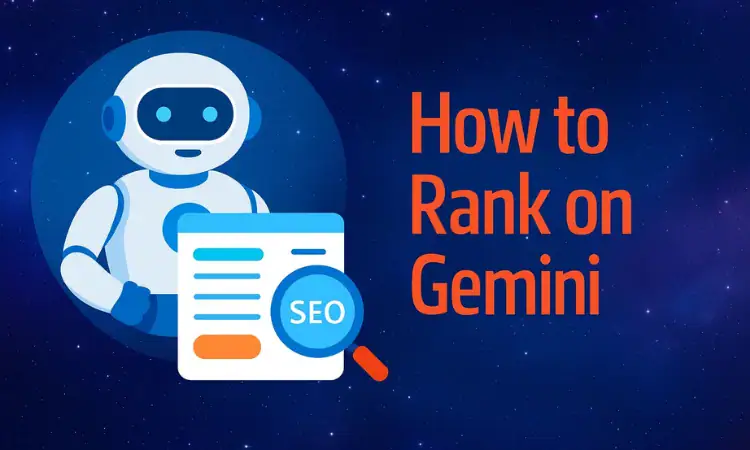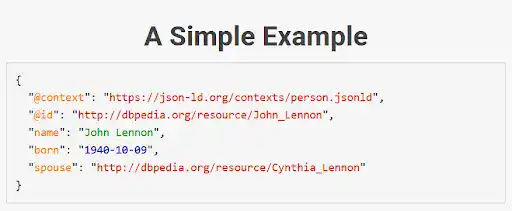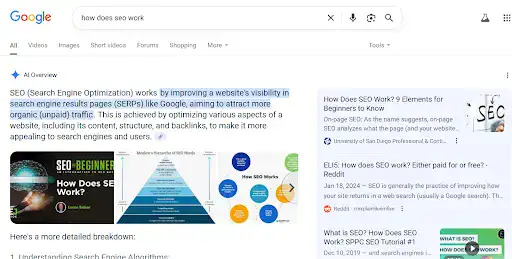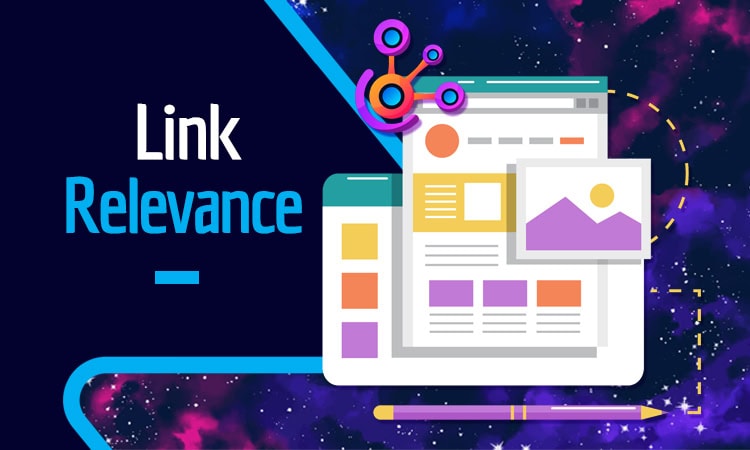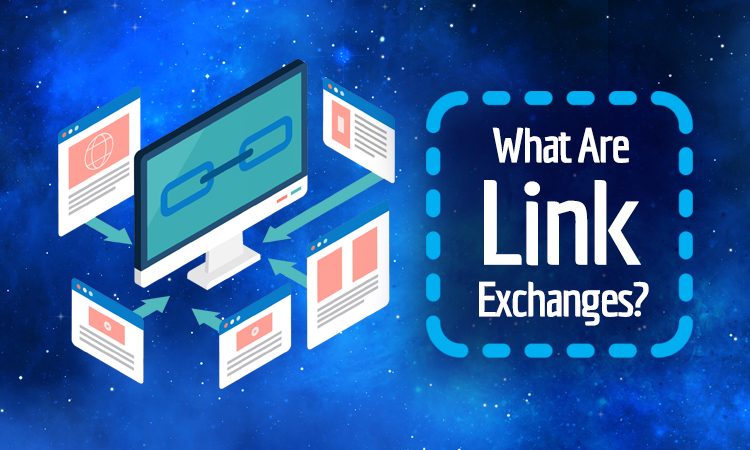Google’s Gemini AI has over 350 million monthly active users, with 35 million using it every day. Though the search tool has not yet surpassed ChatGPT’s 160 million daily active users, its integration into Google’s traditional search engine results makes it a powerful tool for search engine optimization (SEO).
This article will discuss Gemini’s indelible impact on Google Search, its ranking factors, and how you can integrate AI SEO into your traditional SEO strategy.
What Is Gemini and Why Does It Matter for SEO?
Google Gemini is one of the most successful large language models (LLMs) available, as it is integrated into Google Search as part of the company’s Search Generative Experience (SGE).
AI search results provide users with a direct answer to their inquiry, called zero-click searches; in other words, users do not need to use any of the traditional blue links below the AI-generated content if they only need a general overview.
Being cited as an answer to user questions can drive website traffic and improve visibility, making it a crucial element of today’s SEO.
How Gemini Sources and Displays Information
Google’s Gemini tool is unique in that its AI answers provide dynamic, context-aware information to users based on their specific needs. The program relies heavily on many of the traditional SEO ranking factors.
- Top-Ranking Organic Pages: If you appear high on standard search results, you are more likely to be cited by AI.
- Structured Data: Using appropriate schema types and an orderly website hierarchy makes it easier for AI crawlers to review your content.
- Snippets: Short and context-rich information will make you more likely to show up in results.
- AI Summaries: The clearer and simpler your language is, the more likely that you’ll be referenced.
- Authoritative Sources: Gemini relies on the same trust signals as other SEO processes, so cite good sources.
Gemini vs. ChatGPT: Key Differences in Ranking
If you’ve researched how to rank on ChatGPT, you’ll be heartened to learn that Gemini uses many of the same ranking factors. However, these AI models use slightly different algorithms, which prioritize certain elements over others.
| Gemini | ChatGPT | |
| Search Integration | Integrated with Google Search | Integrated with Microsoft Bing |
| Live Data Access | Yes, the Live API is available for all users | Available with ChatGPT Pro, but not available for all users |
| Citation Methods | Uses hyperlinks and snippets directly in search results | Does not cite its sources |
| Prompt Dependency | Requires more precise and structured prompts | Can perform well with longer prompts |
| Modality | Multimodality: can analyze videos, text, audio, and photos | May not be able to extract information from these sources |
Understand Search Intent in the Gemini Environment
Google’s Gemini will refine its answers based on search behavior, specifically intent. Several primary user intents will influence what sources are cited.
- Informational: These are usually framed as questions, such as “What does DNA do?” For this purpose, FAQ or question-and-answer formats will help you rank.
- Commercial: These are things like “What is the best for…” or “What should I buy if…” Explaining your product or service’s specific intent and its strengths will improve your rankings.
- Navigational: These queries typically include a brand or product name, requiring high brand visibility and awareness. Using your product or brand name throughout the text will help Google Gemini direct users to your site.
To improve your AI performance, develop an intent map based on your specific services and implement keywords that are relevant to the given intent.
Optimize for Featured Snippets and PAA
Gemini will extract featured snippets for use in its summaries and “People Also Ask” (PAA) features. To appear in these, you should use clear, concise formatting, such as lists, bullet points, FAQs, and summary boxes.
The more closely your text aligns with what people search for, the more likely you will be included in these features. Exact-match phrasing, particularly with questions and answers, can improve content readability and brand mention frequency.
Structure Content for Generative Overviews
Content planning is not enough; you must also consider content structure. Gemini quickly scans millions of pages to find the correct information, so more scannable content will perform better.
To improve your content structure, include the following elements:
- Scannable blocks, such as summaries at the top of the page
- Clear headings, with “jump to” hyperlinks
- Frequently asked questions with short answers
- Bullet points, like lists of symptoms or product lines
Implement and Validate Structured Data
Using the right schema types can make a significant difference in whether Google’s Gemini model cites you. JSON-LD code is a type of schema markup that identifies what kind of data is being handled, whether that is a person or an organization.
Schema.org provides examples of the different markups you can use to notate what a page is about.
- Article: Article is typically used for news articles or investigative reports, but you can also use it for original research.
- FAQPage: FAQPage denotes a Frequently Asked Questions page, with questions and answers to common questions.
- HowTo: If you have a tutorial, such as how to use a product or complete an activity, then use HowTo in your schema markup.
- LocalBusiness: Local businesses can provide contact information, addresses, and business hours using the LocalBusiness markup.
- Person: Person is used for business leaders, creative professionals, and other notable persons, including their name, credentials, and contact information.
- Product: Any product or service page should use the Product markup, which explains what the product is, how it is used, and where to purchase it.
You can use Schema.org’s validator tool or Google’s Rich Results Test to ensure that you have used the proper markup.
Build Topical Authority Through Content Clusters
You must ensure that you establish authority through consistent and thoughtful content creation, centered around primary themes. This will help Gemini parse your authority and identify what topics are most closely associated with your brand.
A hub-and-spoke model, with proper linking between pages, will center your content around primary themes. For example, you can create pillar pages that offer a general overview of a given topic, then link to smaller pages that go into greater depth about a certain element of your services.
Optimize for Long-Tail and Conversational Queries
Natural language has become a key feature of modern SEO because AI chatbots are designed to answer user questions using conversational phrases. This is part of the reason why FAQ pages are so helpful: they are posed as if the user is asking a question.
The Semrush AI Toolkit identifies keywords that perform best in conversational queries like those with Google Gemini. AnswerThePublic is another excellent tool that reviews autocomplete data, including from Gemini, so that you can develop content that exactly matches what Gemini expects from users.
Improve Readability and UX Across Pages
User experience (UX) plays a key role in both AI and traditional SEO. Though AI systems do not read like humans do, they rely on the same signals to quickly review and summarize content.
Short paragraphs, ample white space, and intuitive navigation allow for faster synthesis and connection between related topics. Similarly, mobile-responsive designs will affect both your SEO ranks and whether Google cites you.
Use First-Party Data and Original Insights
Proprietary data will set you apart while signalling your authority for Gemini responses. If you can answer a question that no one else has covered yet, you have filled a content gap and made your website more likely to be cited for specific inquiries.
Excellent options for gathering proprietary data include:
- User surveys
- Internal process reviews
- Case studies
- Market research
- Data overviews
- Literature reviews
- Internal benchmark analysis
Demonstrate E-E-A-T with Visible Expertise
AI-generated answers are based on many of the same things that provide you with a competitive edge on Google in general, including aligning with the company’s E-E-A-T standards. You can improve your E-E-A-T signals through the following action items.
- Cite high-quality sources like government sites or academic journals.
- Provide author bios on your site, with a link to sources like industry awards.
- Use publication dates, and note when pages are updated.
- Provide transparent information about your review process.
Include the Right Visuals and Multimedia
Gemini is a multimodal AI that can review visual and multimedia formats as well as text. Diagrams, videos, comparison tables, and annotations allow Gemini to reference visual content.
When using video or audio, embed a transcription or use captions. Not only does this improve the user experience, but it also allows you to utilize keywords.
Maintain Clean Site Architecture and Indexability
Technical SEO remains key to search engine success. A highly crawlable website will perform better on search engine pages and Gemini overviews.
These are some of the most crucial components of a clean site architecture:
- Use metadata, like title tags and meta descriptions, to teach Gemini what your pages are about.
- Use Search Console to check for crawl errors and adjust your robots.txt.
- Maintain consistent internal linking and use tools like Screaming Frog to check for orphan pages.
- Use noindex tags for low-content pages like submission forms, login pages, duplicate content, or pages still in development.
- Submit XML sitemaps through Search Console to speed up indexing.
Target AI-Triggered Keywords Strategically
While all keywords can have benefits, not all of them will trigger an AI snapshot. Keyword.com’s AI Overviews Tracker is a tool that can help you identify which keywords in your niche are most likely to trigger a Gemini overview, but in general, three types of keywords do best.
- Prompt Keywords: Prompt keywords work similarly to Boolean modifiers in that they guide the AI to prioritize or deprioritize certain things. For example, “How to clean shoes with no shoe polish.” The AI would then look at shoe repair sites and search for “no shoe polish.”
- Question-Based Queries: Most users will ask a question, such as “How do I improve SEO rankings?” By incorporating questions into your text, you will more exactly match what Gemini is seeking.
- Modifier Phrasing: Modifiers include “best,” “cheapest,” “most common,” “top rated,” or “near me.” Adding these in front of your primary keywords will improve your chances of a citation.
Track Gemini Rankings and Visibility
Now that Google’s Gemini has taken precedence in search results, SEO companies have developed tools to track your rankings.
The Semrush AI Toolkit reviews your visibility on AI platforms, including Gemini, and is available with a Semrush account. To start, input your domain URL. Semrush will then analyze your site, search for any Gemini citations, and provide AI-powered insights into how to improve.
BrightEdge also has a plethora of AI tools, including AI Catalyst. This tool tracks brand sentiment across multiple AI systems and offers suggestions for how to improve.
Secure High-Authority Mentions and Digital PR
Gemini uses similar trust signals to typical Google results, meaning that mentions from high-authority domains like Forbes, G2, Wikipedia, academic journals, and government sites will boost visibility.
Digital PR is a highly evolved field, but you can begin setting the groundwork for this tactic through the following steps:
- Build relationships with content platforms.
- Produce high-quality original content.
- Secure link placements on authoritative sites.
- Develop guest post content and editorial pieces.
- Utilize Help a Reporter Out to build authority.
- Issue keyword-optimized press releases.
Our custom link building services work perfectly for this, if you don’t want to tacke it in-house.
Reinforce Brand Association Through Internal Linking
Your site architecture is a key element of getting cited. Audit your website’s anchor text and develop a streamlined navigation bar that lists all the most important pages.
You should also search for new internal linking opportunities through contextual linking. This reinforces your topical authority and improves your chances of being cited.
Strengthen Local SEO Signals for Gemini
Local SEO remains key as users search for local entities. You can improve your local SEO through the following tips:
- Claim and optimize your Google Business Profile with a link to your site.
- Ensure that Name, Address, and Phone Number (NAPs) are consistent across all listings.
- Localize your landing pages for better impact.
- Geotag your schema with addresses, geolocations, and local keywords.
Build for Multilingual and International Markets
Gemini is a global force, and if you work in more than one country, you’ll want to ensure that you can rank elsewhere, too. These best practices can improve your visibility:
- Use hreflang to clarify the text’s language.
- Use tools like Schema App to develop multilingual schema markup.
- Work with local translators who can research high-ranking keywords in the target language.
- Optimize for specific markets using local keywords.
Repurpose High-Performing Content for Gemini
High-performing organic content may not always work well for AI snapshots. For example, it may lack snippets that Gemini can scan and integrate, or it may not be structured properly.
For example, if we search for “How does SEO work?”, we see that the University of San Francisco was cited as a source, but the first organic result is from the Digital Marketing Institute. While the content is good, it likely wasn’t cited because the headers are not specific enough. Fixing this may ensure that the Digital Marketing Institute is cited by Gemini.
Understand Gemini’s Integration with SGE and SERPs
While most obvious in the AI overviews that Google users see when asking a question, Gemini has been thoroughly integrated into Google’s ecosystem, including Gmail, Google Meet, and Android phones.
The Gemini dialogue box appears at the top of the search page, with the organic results below. On the right side are the links that appear in the answer. The goal is to get into this right-side panel, which can be achieved by focusing on snippets, using a question-and-answer format, and appearing on trusted sites like academic pages.
Avoid These Gemini Ranking Mistakes
- Thin Content: Gemini prioritizes rich and highly focused content. Add more detail and citations.
- Missing Schema: Schema markups teach sites what your page includes. Add the JSON-LD code mentioned above to improve your markups.
- Missing Author Information: Include author bios and links to awards, as this establishes credibility.
- Improper Formatting: Use clear headers, short paragraphs, and clean HTML.
- Overreliance on Automation: While using AI can be helpful, you should also ensure that the language sounds natural and is not overoptimized.
Future-Proof Your Content for AI-Driven Search
LLM optimization is a continual process as algorithms grow more complex. Generative SEO Services (GEO) start optimizing your website to better align with what AI platforms have identified as a good source, but your work does not stop there.
You must identify what factors have helped you appear in AI-generated answers, then adjust your content to conform to what updated AI algorithms expect. Our SEO professionals are at the forefront of this revolution and can assist you with AI-aware on-page optimization.
Examples of Real Brands Optimizing for Gemini
Influencer Marketing Hub collected a benchmark of recent findings, including the fact that AI home platform Flyhomes grew its organic traffic by 10,737% in 3 months through a focused content strategy with optimized keywords. This started after acquiring another site and performing extensive 301 redirects to funnel link equity from older pages.
Measuring ROI and Engagement in Gemini Results
- Search Console: You can track AI mode traffic from Search Console, though it’s not segregated from other metrics.
- Microsoft Clarity: This free tool lets you review user sessions and develop AI session heatmaps.
- Factors.AI Path Analysis: Review how users engage with your site, including what paths they take while navigating.
- Semrush AI Overview: Check your position in AI overviews and gain actionable tips to improve.
Stay Ahead of the AI SEO Curve by Ranking in Gemini
In today’s online ecosystem, SEO success means writing thoughtful, high-quality content that Gemini and other answer engines are more likely to reference in website citations. Quality content and a solid site structure will provide you with a competitive edge over those still focusing only on traditional SEO.
FAQs about Gemini Rankings
What is Google Gemini?
Gemini is an AI-powered answer engine that can analyze multimodal information, such as text, video, and audio, to answer search queries.
How does Gemini choose what content to show?
Like other AI models, Gemini is extensively trained on data to understand search intent and context, but it can also pull from online citations to provide more relevant and up-to-date answers.
Is Gemini replacing traditional search results?
No, Gemini is not replacing traditional search, though it is enhancing its functionality by better aligning with user intent.
What tools can help track Gemini rankings?
To start, Google Analytics and Google Search Console can help you identify what AI crawlers “see” when they visit your site and improve your schema markup so you are more likely to appear in snippets. You can also use free tools like BrightEdge AI Catalyst, which can track AI search sentiment and visibility.
Related Guides and Resources









